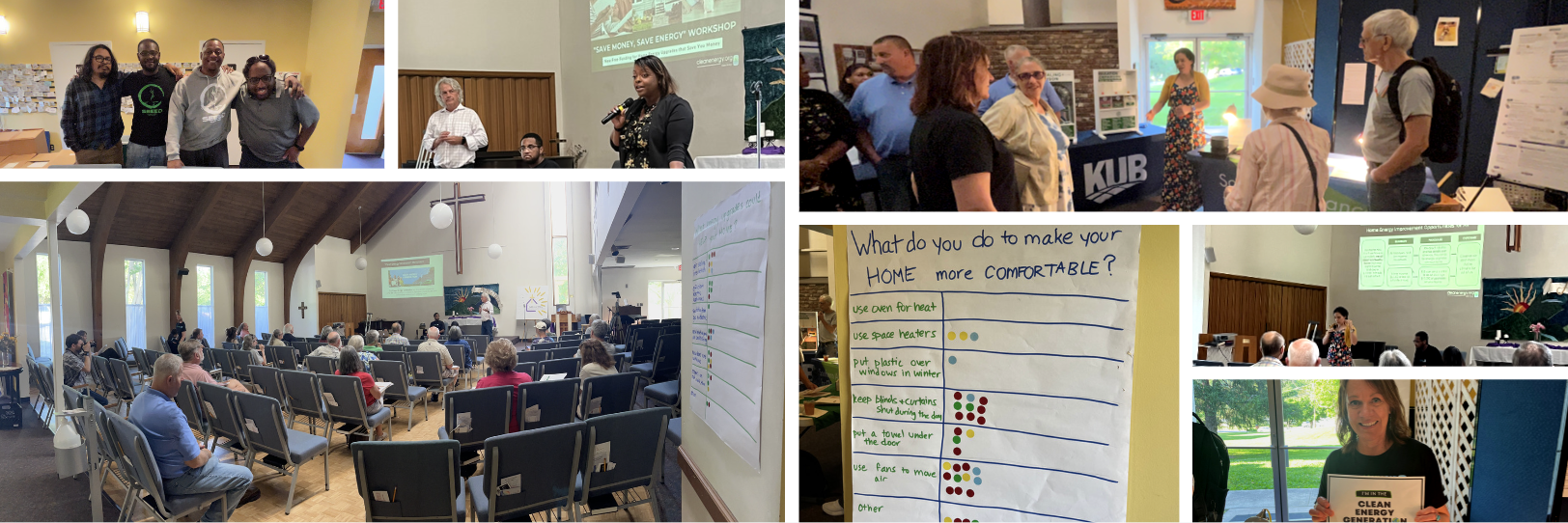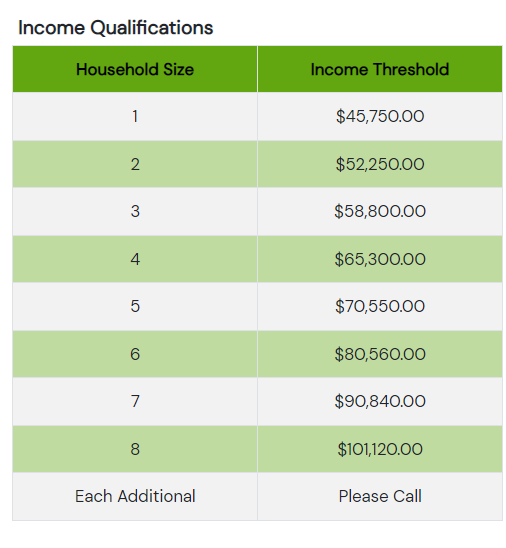SACE hosted a workshop in Knoxville to help spread awareness about the unprecedented opportunities for residents to make home improvements that reduce energy use, lower utility bills, and improve comfort and safety.
Cary Ritzler, Chris Carnevale, and Julian Harden | May 31, 2023 | Clean Energy Generation, Energy Efficiency, Energy Justice, Tennessee, UtilitiesDid you know that you could save hundreds of dollars per year on your energy bills by making just a handful of upgrades in your home? Sealing gaps and cracks in your walls and windows could save you 15% on your energy costs and replacing a 10-year-old air conditioner could save you 20 – 40% on cooling costs. And did you know that by making upgrades to your home you’ll not only save money but also breathe easier knowing your home is healthier and more comfortable?
On May 17, SACE staff, along with partners from SEEED, Sierra Club – Harvey Broome Group, Three3, and the Knoxville Utilities Board (KUB) hosted a “Save Money, Save Energy” workshop to help Knoxville area residents learn about newly available, once-in-a-generation funding, resources, and rebates for a wide range of energy efficiency upgrades.

Attendees learned about local and federal programs to make homes more comfortable and healthy and lower energy bills, for people of all income levels and for renters and owners alike.
Locally, KUB’s free Home Uplift program will complete free repairs and upgrades on homes, averaging $10,000 worth at each home, for KUB customers who qualify for the program by meeting income caps.
On the federal level, programs in the Inflation Reduction Act make home energy efficiency available to many more. Read below to learn about each program.
KUB Home Uplift
The Home Uplift program offers income-qualified residents large upgrades to their homes, like repairing or replacing heating and cooling equipment, insulating attics and walls, replacing appliances, and electric water heaters. The improvements are made free of charge through KUB and their electricity supplier, TVA. To qualify for the program, residents must be KUB electricity customers and make less than 80% of the area median income (see chart below for 2023 income limits).

If you qualify, sign up right now to start the process to receive thousands of dollars worth of free home energy improvements. Professionals are ready and waiting to come into eligible homes and do the handy work for you.
IRA Tax Credits and Rebates
Federal tax credits and rebates are additional tools for many more residents that can assist with funding home energy improvement projects such as upgrading appliances, water heaters, heating and air systems, and more.
The Inflation Reduction Act (IRA) was passed in August 2022, investing hundreds of billions of dollars in households and communities to help people transition to clean and renewable energy. Funding for households comes primarily from two separate programs: tax credits and direct rebates.
IRA Home Energy Tax Credits
The IRA tax credits are available now, and are useful for anyone who has a tax liability–meaning that you pay taxes throughout the year or in a lump sum at the end of the year. A tax credit can reduce the amount of taxes that you owe, and keep more of your money in your pocket. Through the IRA, there are tax credits of up to 30% for insulation and air sealing, heating and cooling equipment, water heaters, efficient windows and doors, electrical work, solar panels, electric vehicle chargers, and battery storage. There are also tax credits for new and used electric vehicles. Most of the tax credits have an annual cap, but can be accessed year after year until 2032. The tax credits are available to use immediately.
For more information on tax credits, click here.
Upfront Home Energy Rebates
The IRA also contains upfront rebate programs to help consumers purchase new energy efficient appliances and home upgrades. The programs are still being developed by the U.S. Department of Energy and each participating state’s government, but are expected to be available to residents in 2024 through each state’s energy office or their administrators.
Since the exact rules of the rebate programs are still in development, we will report in this blog what is written in the legal text of the IRA to give you an idea of what the rebate programs could look like. However the U.S. Department of Energy and individual state energy offices may have some liberties in how exactly they implement the programs, so please make sure you are registered to get updates on when the programs are available by participating in SACE’s Clean Energy Generation. We will continue to update our members on new programs and opportunities to get engaged during public comment periods.
There are two home energy rebate programs, created by the IRA: the HOMES energy efficiency program and the High-Efficiency Electric Home Rebate (HEEHR) program.
The HOMES energy efficiency program will provide thousands of dollars in upfront rebates for making homes more energy efficient. The program will be available for owners of single-family and multifamily homes, as well as for aggregators such as landlords carrying out projects at multiple residences.
The HEEHR program will provide thousands of dollars to purchase new efficient electric appliances to replace gas- or propane-burning appliances. Rebates will be available for stoves/ovens/cooktops, heating and air systems, hot water heaters, clothes dryers, electrical panels and wiring, and air sealing, insulation, and ventilation. The program will be available only to households with low- to moderate-income (less than 150% area median income) and multifamily buildings where at least half of the households fall under the income limits. The rebates cover 100% of costs for low-income households (less than 80% area median income) and 50% of costs for moderate-income households (80-150% area median income).
For more information on the rebate programs click here. Also, be sure to stay in touch with us at SACE, as we will be working to make sure our members are informed about these important programs as they become available next year.
Justice40
At the workshop, we also shared about the federal Justice40 initiative. Justice40 is a commitment from President Biden that federal agencies under his administration will send 40% of the overall benefits of federal clean energy and climate investments into disadvantaged communities that have been ravaged by issues related to environmental and socioeconomic conditions.
Federal spending subject to the requirement of delivering 40% of benefits to Justice40 communities spans several categories, including climate change, clean energy and energy efficiency, clean transit, affordable and sustainable housing, training and workforce development, remediation and reduction of legacy pollution, and the development of critical clean water and wastewater infrastructure.
There are several areas in Knoxville that are considered Justice40 areas, including the area around our event venue, the Church of the Savior, as you can see on the map designed to track disadvantaged areas throughout the country from the Climate and Economic Justice Screening Tool. Justice40 should help these neighborhoods benefit from the current federal investment into clean energy.

Workshop Materials:
Here are some materials that we shared at the workshop:
- “Save Money, Save Energy” Presentation
- About: Home Energy Improvement Credits and Rebates
- Inflation Reduction Act FAQ
- Federal Home Energy Rebate Programs
- Federal Home Energy Tax Credits
- Clean Energy Generation 101
- Home Uplift Program
More Workshops:
This workshop built upon events we helped host earlier this year in Athens, Georgia to help inform residents about funding and opportunities for home energy improvement.
Looking forward, we have plans to host two more workshops like this in the coming months within the KUB service territory, so make sure you are signed up for email updates from SACE so you can stay tuned for the invitations. And please share this blog post with any friends or family members you think would be interested in learning about these new funding sources or attending a future educational workshop.
Thank you to our partners for co-hosting (SEEED, KUB, Harvey Broome Group of the Sierra Club, and Three3) and everyone who attended the workshop!
Together, all of us who are taking action are part of the Clean Energy Generation movement. We’re coming together to create healthier communities and a more secure and sustainable environment, starting now. No matter your age, income, zip code, or abilities, you can play a role. You don’t have to have the answers. Learning more is a great way to start. Join us, and we’ll share ideas, resources, tools, and practices to show how we can all be part of the transformation.